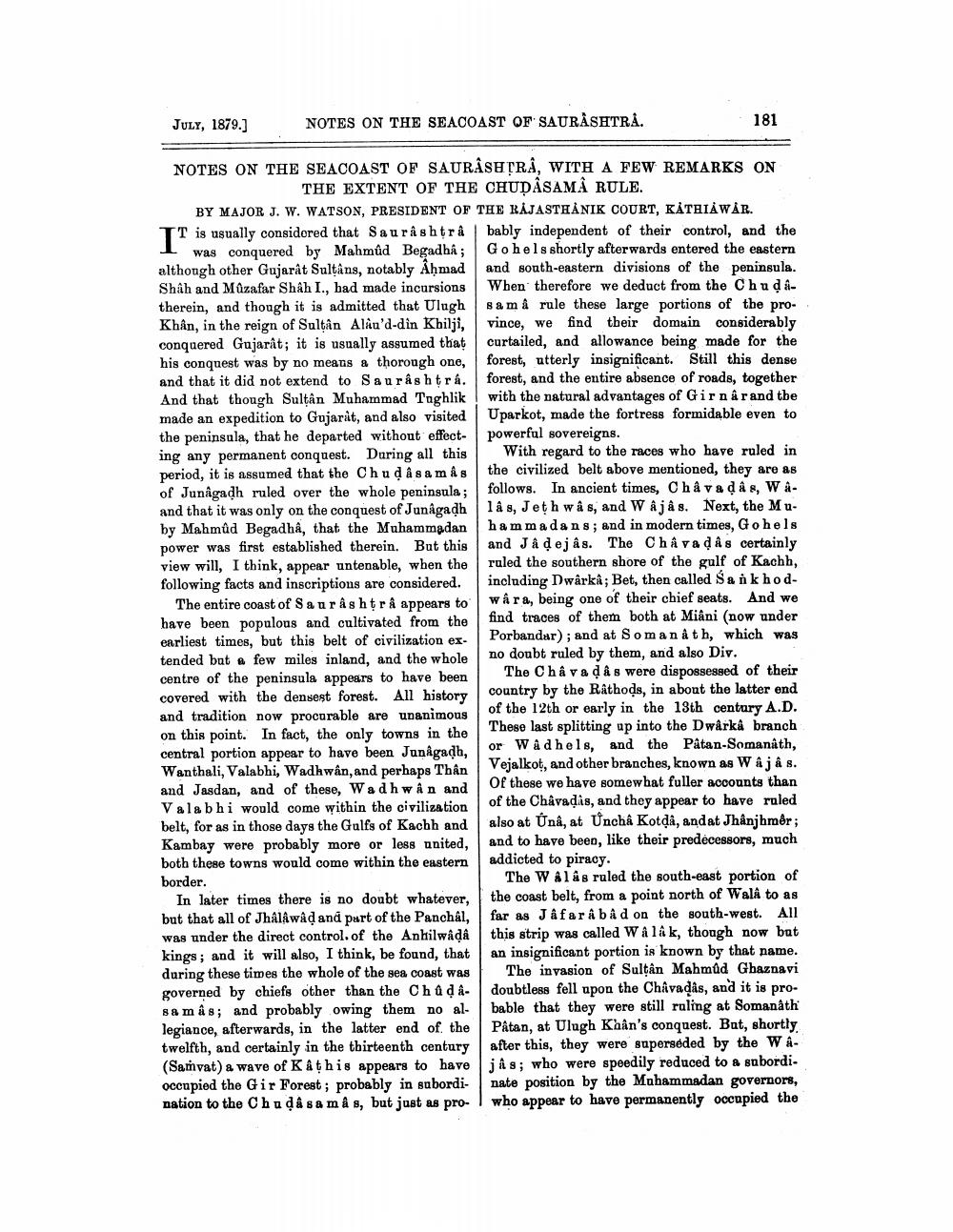________________
JULY, 1879.]
NOTES ON THE SEACOAST OF SAURASHTRÅ.
181
NOTES ON THE SEACOAST OF SAURASHTRA, WITH A FEW REMARKS ON
THE EXTENT OF THE CHUDASAMĂ RULE. BY MAJOR J. W. WATSON, PRESIDENT OF THE KAJASTHÅNIK COURT, KÅTHIÀWÅR. TT is usually considored that Saurashtrabably independent of their control, and the
was conquered by Mahmûd Begadha; Gohels shortly afterwards entered the eastern although other Gujarat Sultáns, notably Ahmad and south-eastern divisions of the peninsula. Shâh and Mazafar Shah I., bad made incursions When therefore we deduct from the Chudátherein, and though it is admitted that Ulugh sama rule these large portions of the proKhân, in the reign of Sultan Alau'd-din Khilji, vince, we find their domain considerably conquered Gujarât; it is usually assumed that curtailed, and allowance being made for the his conquest was by no means a thorough one, forest, utterly insignificant. Still this dense and that it did not extend to Saurashtrá. forest, and the entire absence of roads, together And that though Sultan Muhammad Taghlik! with the natural advantages of Girnar and the made an expedition to Gujarat, and also visited Uparkot, made the fortress formidable even to the peninsula, that he departed without effect powerful sovereigns. ing any permanent conquest. During all this With regard to the races who have ruled in period, it is assumed that the Chu dâ sa mas the civilized belt above mentioned, they are as of Junagadh ruled over the whole peninsula; follows. In ancient times, Chavadas, Waand that it was only on the conquest of Junagadh
1 às, Jeth was, and W âjâs. Next, the Muby Mahmûd Begadhà, that the Muhammadan hammadans; and in modern times, Gohels power was first established therein. But this and J å dejas. The Châ va das certainly view will, I think, appear untenable, when the ruled the southern shore of the gulf of Kachh, following facts and inscriptions are considered. including Dwarka; Bet, then called Sa n k hodThe entire coast of Sau râsht r & appears to
wara, being one of their chief seats. And we have been populous and cultivated from the find traces of them both at Miâni (now under earliest times, but this belt of civilization ex. Porbandar); and at Somanåth, which was tended but a few miles inland, and the whole no doubt ruled by them, and also Div. centre of the peninsula appears to have been
The Cháva dâs were dispossessed of their covered with the densest forest. All history country by the Rathods, in about the latter end and tradition now procurable are unanimous
of the 12th or early in the 13th century A.D. on this point. In fact, the only towns in the
These last splitting up into the Dwarka branch central portion appear to have been Junagadh,
or Wad hels, and the Pâtan-Somanath, Wanthali, Valabhi, Wadhwan, and perhaps Thân
Vejalkot, and other branches, known as Wâjâs. and Jasdan, and of these, Wadhwan and
Of these we have somewhat fuller accounts than Valabhi would come within the civilization
of the Chavadis, and they appear to have ruled belt, for as in those days the Gulfs of Kachh and also at Unâ, at Unchå Kotda, andat Jhanjhmer; Kambay were probably more or less united,
and to have been, like their predecessors, much both these towns would come within the eastern
addicted to piracy border.
The W Alas ruled the south-east portion of In later times there is no doubt whatever, the coast belt, from a point north of Walk to as but that all of Jhâlâwâd and part of the Panchal, far as Jafar Abad on the south-west. All was under the direct control of the Anhilwada this strip was called Wâlâk, though now but kings; and it will also, I think, be found, that an insignificant portion is known by that name. during these times the whole of the sea coast was The invasion of Sultan Mahmud Ghaznavi governed by chiefs other than the Chad a doubtless fell upon the Chavadas, and it is prosa mâs; and probably owing them no al bable that they were still ruling at Somanath legiance, afterwards, in the latter end of the Pâtan, at Ulugh Khan's conquest. But, shortly. twelfth, and certainly in the thirteenth century after this, they were superseded by the WA(Saṁvat) a wave of Kathis appears to have jâs; who were speedily reduced to a subordi. occupied the Gir Forest; probably in subordi- nate position by the Muhammadan governors, nation to the Chudá sa mås, but just as pro- who appear to have permanently occupied the




